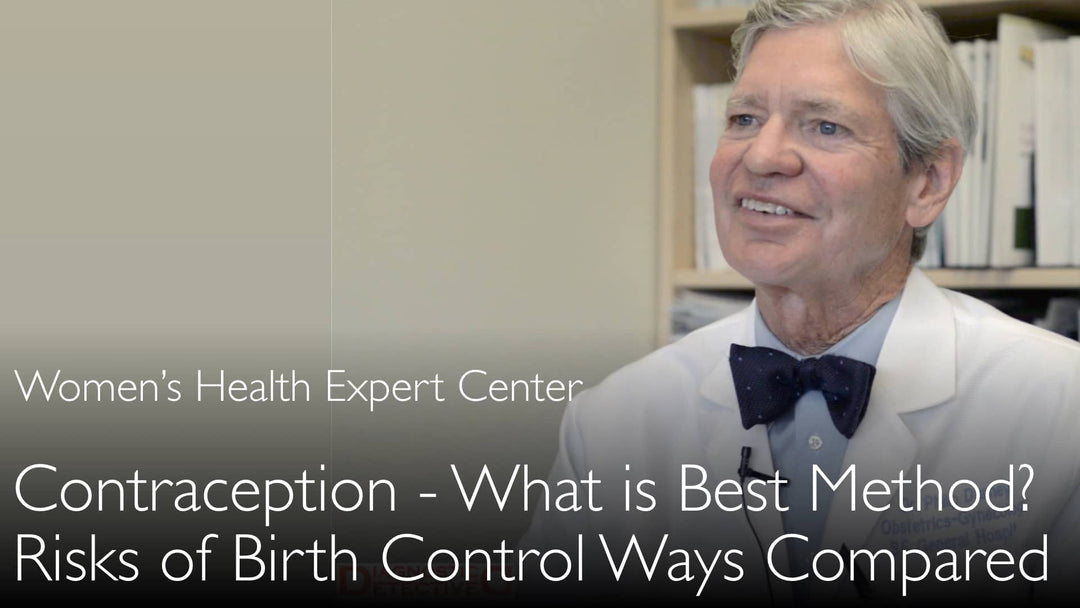Most Effective Birth Control Methods: Why IUDs and Hormonal Implants Are Better Than the Pill
Leading expert in reproductive medicine, Dr. Philip Darney, explains why the most effective birth control methods today are not the pill, but rather long-acting reversible contraceptives like intrauterine devices (IUDs) and hormonal implants. In a detailed conversation with Dr. Anton Titov, MD, the UCSF professor breaks down the benefits, safety, and cost-effectiveness of modern contraception methods. The discussion focuses on how these technologies support women's health, reduce unintended pregnancies, and empower family planning.
Jump To Section
- Why the Pill Is Still Popular Despite Better Birth Control Options
- Most Effective and Safe Birth Control Methods Today
- Why Long-Acting Contraceptives Are Gaining Global Popularity
- Preventing Unintended Pregnancy with IUDs and Implants
- Are IUDs and Hormonal Implants Cost-Effective?
- Reversibility and Fertility After IUDs and Hormonal Implants
- Full Transcript
Why the Pill Is Still Popular Despite Better Birth Control Options
The birth control pill remains one of the most commonly used contraceptive methods, especially in the United States. Yet, according to Dr. Philip Darney, there are safer and more effective options available. Oral contraceptives require daily adherence and carry risks such as venous thrombosis for some women. While the pill revolutionized reproductive health in the 20th century, 21st-century alternatives offer superior protection.
Most Effective and Safe Birth Control Methods Today
According to Dr. Darney, the most effective contraceptive options are long-acting reversible contraceptives (LARCs), namely hormonal implants and intrauterine devices. These methods are even more effective than surgical sterilization, and their popularity is increasing worldwide due to their high efficacy and safety profiles.
Why Long-Acting Contraceptives Are Gaining Global Popularity
Unlike pills or condoms, long-acting contraceptives remove the need for daily or per-intercourse compliance. IUDs and hormonal implants are discreet, low-maintenance, and provide continuous protection for years. Dr. Darney notes that several clinical trials support their effectiveness in preventing teenage pregnancies and promoting planned pregnancy.
Preventing Unintended Pregnancy with IUDs and Implants
Globally, 40% to 50% of pregnancies are unintended—this is also true in the United States. These unplanned pregnancies often lead to complications and neonatal mortality. Dr. Darney emphasizes that many women who suffer complications or death from pregnancy did not intend to become pregnant. Effective family planning through IUDs or implants can dramatically improve women’s health and infant survival.
Are IUDs and Hormonal Implants Cost-Effective?
While IUDs and implants may have a higher upfront cost, they are significantly more cost-effective over time. Dr. Darney explains that their long-term use reduces the need for constant resupply, and the lack of daily maintenance increases their practical effectiveness. These methods also reduce strain on healthcare systems by lowering the rate of unintended pregnancies.
Reversibility and Fertility After IUDs and Hormonal Implants
One of the key benefits of both IUDs and hormonal implants is that their contraceptive effects are completely reversible. Fertility returns promptly after removal, making them ideal for women, including teenagers, who wish to avoid pregnancy temporarily but retain the ability to conceive later. Dr. Darney confirms there is no evidence these methods impair long-term fertility or increase risk of pelvic infection.
Full Transcript
Dr. Anton Titov, MD: Best birth control methods are not birth control pills. But "the pill" is still the most popular contraception method. Leading reproductive medicine expert from California talks about most effective, safe, and cost-effective birth control methods in 21st century.
Dr. Anton Titov, MD: Best birth control methods are intrauterine devices and hormonal implants. They are safe and most effective birth control methods.
Dr. Philip Darney, MD: Hormonal implants are best contraception methods because they are very cheap and long-term use. Hormonal implants and intrauterine devices action is completely reversible. Woman can become pregnant after removing intrauterine device. Pregnancy is initiated after removing a hormonal implant.
Dr. Anton Titov, MD: Best birth control methods. As you mentioned in our conversation a little earlier. The desired pregnancy is one of the most important indicators for the woman's health and health for the future child. So access to safe and effective birth control methods is a very important topic in family planning. Oral contraceptives perhaps have been the one of the most popular methods of contraception. But you published extensively on the safety and efficacy of intrauterine devices and implantable contraception. So what are the most effective and safe ways of birth control (contraception) for a woman today?
Dr. Philip Darney, MD: By far the most effective contraceptives are the long acting highly effective contraceptives you mentioned. It is contraceptive implants and intrauterine contraceptives. They are more effective than surgical sterilization. Because of efficacy and safety their popularity is increasing all around the world. As you point out, the birth control pills have long been the principal method of safe and effective contraception, particularly in the United States. But oral contraceptives are simply not as effective as these long-acting methods. Oral contraceptive pills for a small minority of the women who use them do carry the risk of venous thrombosis. (Deep venous thrombosis) risk from birth control pills exists particularly for women who are already at risk of venous thrombosis. That's been particularly a controversial issue in Western Europe.
Condoms can be very effective contraceptives. But condoms require a lot of effort every time from the couple who is using them. The same is true with any vaginal methods of contraception. So there are real advantages to these long-acting highly effective contraceptives. Intrauterine devices and hormonal implants. Several clinical trials have demonstrated their advantages. Contraceptive implants prevent teenage pregnancy. They encourage planned pregnancy. Remember that all around the world 40% to 50% of pregnancies are unintended. This is also true in the United States. But it's not true in Western Europe.
Some women who have complications in pregnancy or die as a result of pregnancy. Half of them didn't want to be pregnant in the first place. Those women also have premature births. This is the main cause of neonatal mortality. These women didn't want to be pregnant in the first place. So helping them to plan pregnancies is a critical determinant of women's health and infant health.
Dr. Anton Titov, MD: Intrauterine devices and hormonal implants probably remove so much of human factor. A necessity to remember to take a pill every day. You do not have to remember to use condoms every day. Therefore that increases practical efficacy of intrauterine devices and contraceptive implants.
Dr. Philip Darney, MD: Yes. You have a contraceptive implant, it stays there for five years. You don't need to do anything. You are completely protected from unintended pregnancy. Intrauterine contraceptives last even longer than the implants. They are highly effective because of their mechanisms of action. They don't require you to remember to do anything to use them. You don't have to remember to take a pill every day. No need to put a condom on every time before intercourse. Intrauterine devices are cheap. The upfront cost may be much greater. It is the cost when you have the intrauterine contraceptive inserted. But in the long term they are much cheaper than the daily methods of contraception.
Dr. Anton Titov, MD: A woman decides to have a planned pregnancy. Are effects of intrauterine contraceptive devices and hormonal implants reversible? How safe are intrauterine devices for fertility?
Dr. Philip Darney, MD: Their action is completely reversible. There's no evidence that intrauterine contraceptives result in pelvic infections. Woman does not lose her fertility. So we're happy to provide teenagers who want to avoid a pregnancy with an intrauterine contraceptive. If that's what she'd like to use.
Dr. Anton Titov, MD: Professor Darney, thank you very much for this fascinating and very important conversation. The topic of reproductive health and family planning is most important for women and families around the world. I'm very grateful for the opportunity to speak with you today. Thank you!
Dr. Philip Darney, MD: It's been my pleasure. Thanks for your good questions.
Dr. Anton Titov, MD: Best birth control methods. Hormonal implants, intrauterine contraceptive devices – safety and efficacy. How to choose best and safest contraception method?





